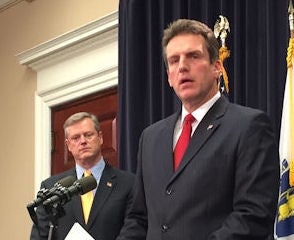Gov. Charlie Baker, who campaigned two years ago on lowering business taxes, is aiming to align Bay State corporate tax policy with that of 23 states around the nation.
The proposed change included in Baker’s economic development bill (H 3978) would affect multistate companies doing business in Massachusetts and eventually reduce state revenues by more than $70 million, according to an administration economist.
Housing and Economic Development Secretary Jay Ash pushed lawmakers to adopt the alteration in the corporate tax formula, along with a reduction in the film tax credit and increases in the low-income housing tax credit, at a Revenue Committee hearing Tuesday.
Ash said the measure would create consistency, avoid “double-taxation” and make the state more competitive.
With some exceptions, in-state revenue accounts for about 50 percent of the formula that determines what portion of corporate profits Massachusetts can tax. Property costs and payroll make up 25 percent apiece of that formula, according to David Davenport, deputy revenue commissioner for legislative and external affairs.
Under Baker’s proposal, by Jan. 1, 2021 a company’s receipts would account for 100 percent of the formula determining the state’s share.
“If a company now puts payroll or property into the state, whether it’s headquarters or a plant, with single-sales-factor apportionment they don’t get penalized,” Davenport told the News Service. “Their tax doesn’t go up because they put investments into the state.”
Kazim Ozyurt, chief economist at the Department of Revenue, said the measure would reduce state revenues by $67 million in fiscal 2022 and $72 million in fiscal 2024.
An administration official said the estimate does not account for businesses that might be attracted to Massachusetts after a change in corporate tax policy.
Baker’s “New Direction for Prosperity” economic plan released during the campaign called for a phase-out of the state inventory tax, an exemption from the corporate income tax for small businesses and reduced business filing fees.
Business-backed groups the Associated Industries of Massachusetts and the Massachusetts High Technology Council support Baker’s corporate taxation measure, while the left-leaning Massachusetts Budget and Policy Center argues the formula change has not been proven to be beneficial when used elsewhere.
Taxes on Massachusetts mutual fund companies, manufacturers and defense contractors are already apportioned based on what is called the single-sales factor.
“There’s no evidence that it achieved any public purpose,” MassBudget President Noah Berger told the News Service. Berger argued corporate tax structure is less of a factor in where companies locate than access to “well trained workers and good infrastructure.”
“Companies tend to locate where they have the workers they are looking for,” Berger said. Baker has said that finding skilled workers is the top concern he hears from the business community.
“We see a growing number of Massachusetts-headquartered technology firms that are taxed under single sales factor apportionment in other states and that believe strongly they should have the benefit of similar policy in Massachusetts,” said High Tech Council Executive Vice President Mark Gallagher in written testimony. “Each time these firms add employees or make capital investments, their tax liability increases under the current rules.”
According to Davenport, some corporations could wind up paying more under the change if more of their revenues are derived from Massachusetts.
“It works both ways,” Davenport said. “You lose some revenue here. You collect some revenue there.”
The constitution requires that “money bills” changing state taxation policy originate in the House. Last year after the Senate added tobacco taxes to the budget sent over from the House the two branches’ disagreement over whether the annual spending bill qualified as a “money bill” reached as far as the Supreme Judicial Court.
Asked about the prospect of the House sending the Senate another money bill with the governor’s proposed taxation changes, Ash told the News Service, “It’s up to the House and the Senate to figure that one out.”
The Retailers Association of Massachusetts did not take a position on the governor’s proposal.

